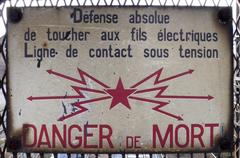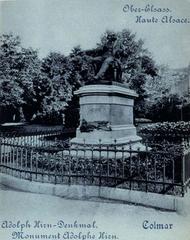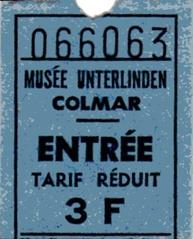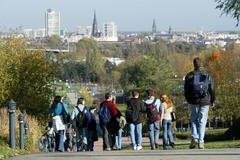
St Martin’s Church Colmar, France: Visiting Hours, Tickets, and Historical Significance
Date: 04/07/2025
Introduction
St Martin’s Church (Église Saint-Martin) is a crowning jewel in the historic heart of Colmar, France. This monumental Gothic edifice embodies centuries of Alsatian religious, artistic, and civic life. With origins that trace to the 10th century and a current structure completed primarily between 1235 and 1365, St Martin’s Church offers visitors an immersive journey through medieval and modern history. Its soaring tower, vibrant stained glass, and ongoing community role make it a must-visit for anyone exploring Alsace (Colmar Tourism; SpottingHistory).
Table of Contents
- Introduction
- Historical Overview: Foundations and Construction
- Architectural Features and Artistic Highlights
- The Church’s Civic and Religious Role
- Restoration and Preservation
- Visiting Information
- Special Events and Cultural Life
- Nearby Attractions
- Frequently Asked Questions (FAQ)
- Conclusion
- References
Historical Overview: Foundations and Construction
Early Origins
Archaeological findings have revealed that the site of St Martin’s Church has been a place of worship since at least the Carolingian era (circa 1000 AD). After a fire in 1106, a Romanesque church arose, the remnants of which remain beneath the current building (SpottingHistory). Construction of the Gothic church began in 1235, driven by Colmar’s growing stature and population. A papal bull from Gregory IX authorized its development, and Master Humbret served as early architect (Saint-Martin de Tours).
Medieval and Later Additions
The core structure—nave, choir, and ambulatory—was completed by 1365. The church was conceived as a collegiate church (governed by canons), which made it a central religious and civic institution. The 1572 fire destroyed one of the planned twin towers; the surviving north tower was crowned in 1575 with a Renaissance lantern, giving the church its unique silhouette (Saint-Martin de Tours).
Architectural Features and Artistic Highlights
Exterior Architecture
St Martin’s Church is constructed from warm-hued Vosges sandstone, with a monumental west façade and a single 71-meter bell tower. The colored tile roof and sculpted tympana add vibrancy and detail, while several portals (some now bricked up) reflect changing architectural trends. The façade’s striking solidity contrasts with the light-filled apse and ambulatory (SpottingHistory).
Note: Two “Judensäue” sculptures on the exterior are now interpreted in educational contexts as reminders of Alsace’s complex religious history (Wikipedia).
Interior Layout
The nave, with five bays and a narthex, leads to a rare ambulatory—uncommon among Alsatian churches—surrounded by chapels. The interior houses funerary monuments, medieval altars, and a remarkable high altar.
Artistic Highlights
- Stained Glass: Surviving windows from the 13th and 14th centuries depict biblical scenes and saints. A rare 13th-century beardless Christ window is a highlight (SpottingHistory).
- “Virgin of the Rose Bush”: A 15th-century polychrome statue, emblematic of regional devotional art.
- Organ Case: The exuberant Baroque organ case (1755, by Silbermann) is an Alsatian masterpiece. The current organ was installed in 1980.
- Thematic Sculptures: Charity motifs, especially St Martin dividing his cloak, appear in keystones and reliquaries (Saint-Martin de Tours).
The Church’s Civic and Religious Role
St Martin’s Church has been pivotal in Colmar’s civic and religious life. As a collegiate church, it wielded influence over local governance and charity. The church remained a Catholic bastion during the Reformation, symbolizing continuity amid change (Sacred Destinations). Briefly, during the French Revolution, it was elevated to cathedral status (1792–1801), underscoring its civic importance (visit.alsace).
Restoration and Preservation
Historical Restorations
Major restoration campaigns in the 19th and 20th centuries repaired war damage, stabilized stonework, and restored stained glass and roofs (Colmar.fr). The church was classified as a Monument Historique in 1840.
Ongoing and Future Work
A comprehensive restoration project (2024–2030) is underway, with €18.5 million allocated for stone replacement, sculpture restoration, roof repairs, and stained glass conservation. Modern techniques such as laser cleaning and micro-abrasion are used to ensure long-term preservation (Colmar.fr).
Visiting Information
Opening Hours
- Regular Hours: Open daily from 8:00 AM to 6:00 PM (some sources indicate 9:00 AM–6:00 PM; check official listings for current hours).
- Variations: Hours may change on Sundays, public holidays, or due to restoration work (Colmar Tourism).
Tickets & Guided Tours
- Admission: Free.
- Guided Tours: Available for a small fee, bookable via the Colmar Tourism Office or on-site. Audio guides are offered in multiple languages.
Accessibility
- Wheelchair Access: Ramps and side entrances are available. Some chapels have small steps; the bell tower is closed to visitors.
- Facilities: Accessible restrooms are available nearby in the Old Town.
Travel Tips
- Best Times: Early mornings or late afternoons offer a quieter atmosphere. Peak times are midday and during festivals.
- Photography: Allowed without flash, except during services. Respect religious ceremonies and parishioners.
Special Events and Cultural Life
- St Martin’s Day (November): Annual celebrations with processions, music, and community gatherings.
- Concerts & Recitals: Regular organ and choral concerts take advantage of the church’s remarkable acoustics (Sacred Destinations).
- Christmas Market: The square before the church hosts festive markets during Advent (worldcitytrail.com).
Nearby Attractions
- Unterlinden Museum: Home to the Isenheim Altarpiece and other major artworks.
- Little Venice: Picturesque canals and half-timbered houses.
- Pfister House and Toy Museum: Further insights into Colmar’s heritage.
Restaurants, cafés, and local shops surround the church, making it an ideal base for exploring the Old Town (francethisway.com).
Frequently Asked Questions (FAQ)
Q: What are the opening hours of St Martin’s Church?
A: Generally, 8:00 AM to 6:00 PM daily, but hours may vary. Check Colmar Tourism for updates.
Q: Is there an entry fee?
A: No, entry is free. Guided tours may have a small fee.
Q: Are guided tours and audio guides available?
A: Yes, in multiple languages. Booking in advance is recommended during the busy season.
Q: Is the church accessible to people with reduced mobility?
A: Yes, but some areas may be difficult to access due to the historic structure.
Q: Can I take photographs inside?
A: Yes, but only without flash and not during services.
Q: Are there special events?
A: Yes, especially St Martin’s Day, organ concerts, and Christmas festivities.
Conclusion
St Martin’s Church is a living emblem of Colmar’s spiritual and cultural heritage. Its Gothic architecture, artistic treasures, and vibrant community role invite visitors to experience the depth of Alsatian history. Free admission, central location, and accessibility ensure that everyone can enjoy this architectural masterpiece. Make the most of your visit by attending a concert, joining a guided tour, or simply enjoying the tranquility of this sacred space.
For the latest updates, guided tour bookings, and more Colmar travel tips, download the Audiala app, visit the official Colmar Tourism website, and explore related posts to enrich your journey in Alsace.
Visuals and Further Resources
References
- Colmar Tourism
- SpottingHistory
- Visit Alsace
- Colmar.fr
- Sacred Destinations
- Saint-Martin de Tours
- Wikipedia
- worldcitytrail.com
- francethisway.com
- fullsuitcase.com
- ostrichtrails.com
- trek.zone





